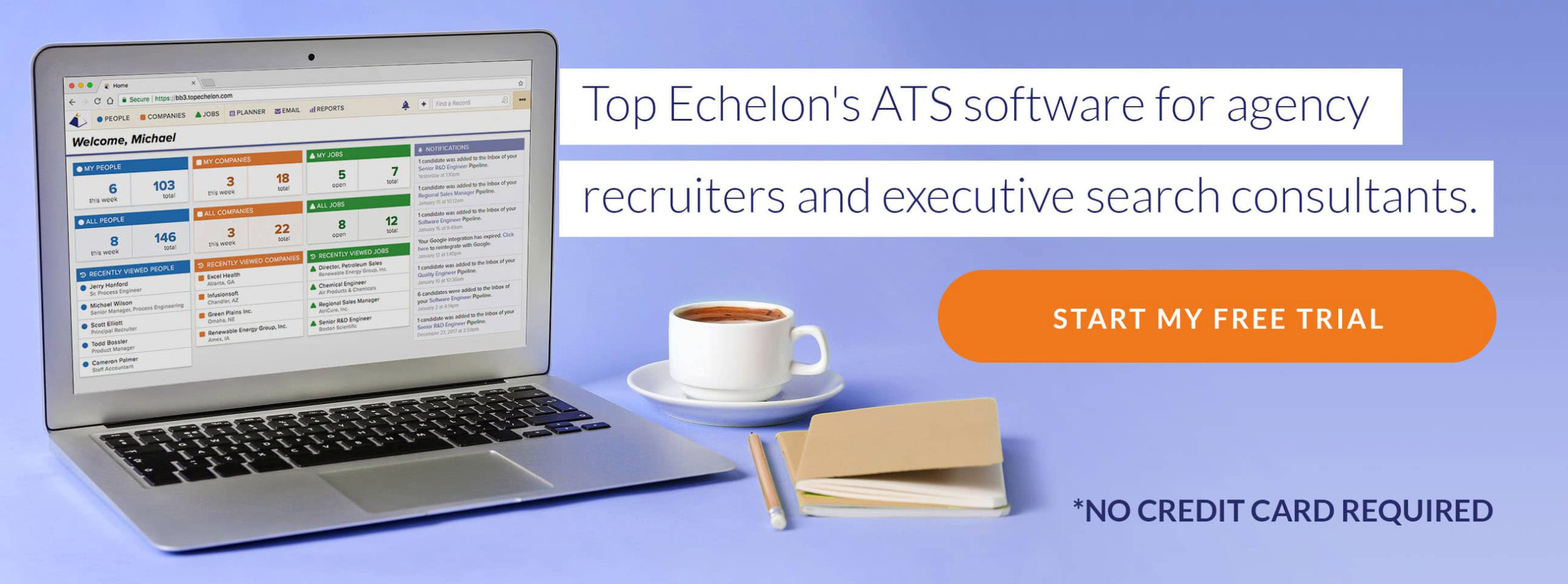As a recruiter, your clients are your customers. But, you also work heavily with job candidates. If the candidates aren’t happy, you’ll have a tough time making your recruiting clients happy. You need loyal candidates and clients who are willing to work with you in the future and refer others to you. For quantifiable data on candidate and client loyalty, try using the net promoter score calculation.
What is the net promoter score?
The net promoter score, or NPS, is a rating that companies use to gauge customer loyalty. Instead of a survey with multiple questions, a net promoter score comes from how a customer responds to one question:
“How likely is it that you would recommend [Company] to a friend or colleague?”
The customer then selects a rating, typically from 0 (not at all likely) to 10 (extremely likely), indicating how likely they are to make the recommendation.
There can also be a follow-up question asking the customer “Why?” or to elaborate on their rating.
NPS was created by Fred Reichheld, along with Bain & Company and Satmetrix. Reichheld was inspired by Enterprise Rent-A-Car’s simple process of determining whether customers would rent vehicles from their business in the future. Likewise, the net promoter score is a simple, one-question survey that determines whether a customer will bring more business with them.
The net promoter score results are meant to directly correlate to a company’s profits or growth, instead of other survey questions that can have little to no relation to profits.
As a recruiter, using the net promoter score can indicate which candidates would be interested in working with you again and making candidate referrals. You can use this data to reach out to the candidates who are not likely to contact you and ask how you can improve recruitment process. And, you can make changes to your recruiting process. If the results are positive, you can boost your credibility with other clients by showing them your recruiting success.
Or, you can ask candidates whether they would refer other candidates to your client’s company. Then, you can reveal the results to your client to help them make decisions on changes to their business.
You can also use the net promoter score on your clients to determine whether they are satisfied with the work you did for their company. The NPS indicates whether they will use your services again in the future and if they will refer other companies to you.
Candidates and clients extremely likely to recommend your recruiting services are loyal customers. These individuals are impressed with the results of your services and willing to tell others about you.
For this article, we’ll use the term “Customers” in place of “Candidates” and “Clients.”
Net promoter score calculation
Customers fall into three categories based on their responses to the survey:
- Promoter: Those who give a rating of 9 or 10
- Passive: Those who give a rating of 7 or 8
- Detractor: Those who give a rating of 6 or under
The promoter category indicates a loyal customer who will promote your business while the detractor category is for customers who will not. The passive category is a middle ground, but it is not clear whether the customer is indifferent to you, likes you, or dislikes you.
From here, calculating NPS is pretty straightforward. You can calculate NPS by finding the percentage of customers who are promoters and detractors. To do so, divide the number of promoters/detractors by the total number of responses, including passive customer responses. Then, you will subtract the percentage of detractors from the percentage of promoters.
NPS = % of Promoters – % of Detractors
Net promoter scores can range anywhere from -100 (all respondents are detractors) to 100 (all respondents are promoters). Although calculated from percentages, NPS is not a percentage.
Net Promoter Score Calculation at a Glance
Question: “How likely is it that you would recommend [Company] to a friend or colleague?”
Response: Rating on a scale of 0 (not likely) – 10 (extremely likely)
Meaning of Ratings:
- 9 & 10: Promoter
- 7 & 8: Passive
- 0 – 6: Detractor
NPS Calculation:
- % of Promoters = # of Promoters / Total Customer Responses
- % of Detractors = # of Detractors / Total Customer Responses
- NPS = % of Promoters – % of Detractors
Net promoter scores by industry
Ratings vary by industry. The Temkin Group compiled NPS benchmarks in a 2016 study showing the highs, lows, and averages across different industries. For example, auto dealers had an average NPS of 48 while TV service providers had an average of 11.
There is not a set “good” or “bad” net promoter score. But generally, a score above 0 is “good” and a score above 50 is “excellent.” If your score is below 0, it might be time to rethink your recruiting process.
How to calculate net promoter score example
Let’s say you wanted to determine whether candidates who applied for a position with your client would refer your services to other candidates. You received a total of 60 candidate responses to your survey question. Of that 60, you find that 35 were promoters, 10 were passive, and 15 were detractors.
To calculate net promoter score, you first need to determine the percentage of candidates who are promoters and detractors.
Divide 35 (promoters) by the total response number, which is 60.
- 35 / 60 = .583, or 58.3%
Now, divide 15 (detractors) by the total response number of 60.
- 15 / 60 = .25, or 25%
Don’t do anything with the percentage of passive candidates.
Based on these results, 58.3% of your candidates are promoters and 25% are detractors. With this information, you can find your net promoter score.
Subtract the percentage of detractors from the percentage of promoters.
- 58.3% – 25% = 33.3
You have a net promoter score of 33.3 out of 100. Generally, this is a good score, as it is above 0.









